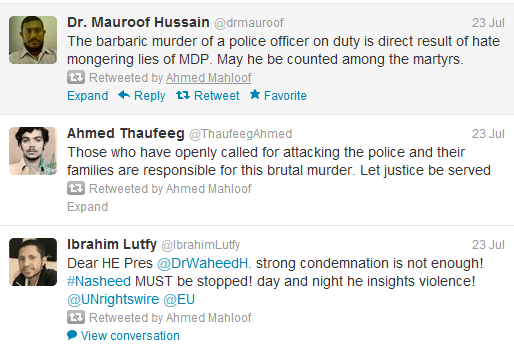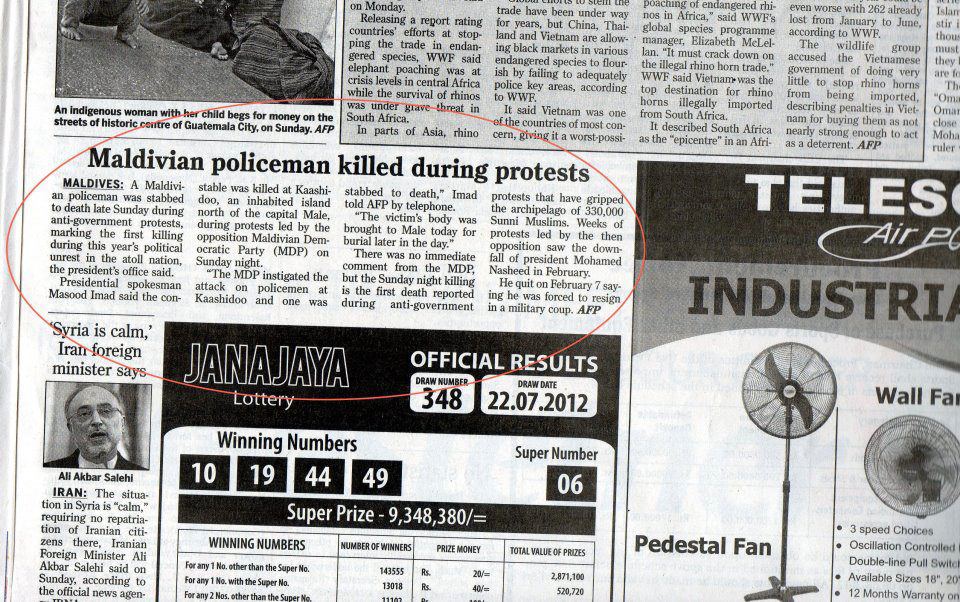Age appropriate sexual and reproductive health education needs to taught in schools to combat the increasing “sexual health illnesses” in the Maldives, according to the Centre for Community Health and Disease Control (CCHDC).
CCHDC’s Public Health Programme Coordinator Nazeera Nazeeb revealed that studies have found high risk behaviors young people – including “unprotected sex, drug and alcohol abuse, homosexuality and prostitution” – are putting them at high risk of sexually transmitted diseases and HIV risk.
During a rapid situation assessment of drug abuse in Maldives in 2003 conducted by the Narcotics Control Board it was found that as many as 75 percent of youth surveyed have had reported having at least one sexual experience by age 21. In 2005, a similar outcome was derived in a Youth Ministry survey, which showed that 14 percent of males and five percent of females under the legal age of 18, admitted to being sexually active.
In both of the unpublished surveys many adolescents and youth reported their sexual encounters were “without condom use”, the basic defense against sexually transmitted diseases (STI), HIV and unwanted pregnancies.
Meanwhile, in 2008 Biological and Behavioral Survey (BBS) conducted among the five most-at-risk groups – including seafarers, men having sex with men, adolescent youths commercial sex workers, and injecting drug users – further highlighted the magnitude of vulnerability these group face.
The report noted that unprotected sex with multiple partners is prevalent among these high risk groups and that the sharing of unsteriled needle and syringes is common among drug users. This study also found risky behaviors among the 15-17 year olds and the older youth, including buying and selling of sex for money often to finance drug use habits, sex with non-regular partners, pre-marital sex, group sex and injecting drugs.
The first anticipated outcome of these high risk behaviors were recorded in a report releases by CCHDC in 2011, which states 18 HIV positive cases were detected and over 400 cases of STIs in 2010, of which 97 percent cases involved women.
Detected STIs included chlamydia and gonorrhea – both conditions that can cause infertility if left untreated.
In addition to the heightening figures on sexually transmitted diseases, Najeeb leading the reproductive health unit of CCHDC said that the centre is witnessing an alarming increase in cases of underage and unplanned pregnancies where some girls are getting pregnant “without even knowing it”.
“These unwanted pregnancies are subsequently resulting in more unsafe abortions, baby dumping or infanticide,” she noted.
In last two years, three newborns have been found dead and two alive. The dead infants included two fetuses, one hidden in a milk tin and the other at the bottom of Male’s municipal swimming pool, while another fully-developed baby was thrown into a park having apparently been strangled by the underwear tied around its neck. Two babies were found abandoned and alive, and have now been placed under state care.
During the five year anniversary of IGMH’sFamily Protection Unit (FPU) in 2010, the hospital officials revealed that a total of 121 unmarried pregnancies were reported to the unit involving several women and girls as young as 14.
Unless it is proved that the conception is the result of rape or that the pregnancy is a threat to the mother’s health, these mothers do not have the legal right to abortion and are forced to take extreme measures due to the stigma of having a child out of marriage.
Speaking about the figures at the time, leading gynecologist at IGMH Dr Aseel Jaleel acknowledged that in such cases pregnant mothers often attempt self-induced abortions, which pose great risks to the mother’s life and pose potential fertility problems later in life.
He reported that two women had died that year from unsafe abortions.
Meanwhile, Najeeb adds: “Not just that, sexual violence committed against girls such as sexual abuse and rapes, remain at alarmingly high levels. “In most cases, abused girls did not even know what happened them, because no one talks to them about it.”
FPU reported that the centre received 42 cases of rape over the five years, of which over half involved minors. Authorities observe that several more cases are likely to be under reported from the Male and especially from the islands which accommodate two thirds of the Maldives’ 350,000 population.
In 2008 the Global School Based Student Health Survey (GSHS) conducted among 1516 students from secondary school signaled an astonishing amount of sexual violence: 17 percent students reported being “physically forced” to have sex.
Furthermore it found high rates of alcohol consumption (6.7 percent) and life time drug use (5.7 percent) while, almost 20 percent of students surveyed reported having suicidal tendencies.
FPU had reported that in cases of rape and abuse, victims often attempt suicide or suffer grave emotional trauma and found an evident connection between substance abuse and gender based violence.
Despite these eye-opening findings and anecdotal evidence on sexual health problems, Najeeb said that many parents feel reluctant to talk to their children about sex and drugs, while the current school curriculum provides little to no information about reproductive health, leaving adolescents and youth unguarded and vulnerable.
In an effort to provide such information, she said that Life Skill Education (LSE) program and the Youth Health Cafe’ program was initiated by the authorities, but over the years both remained active only on a small scale and had not been successful in expanding systemic outreach to vulnerable groups.
When asked whether incorporating compulsory sex education into Maldivian education system could be a solution, Najeeb responded that “adolescents must receive age appropriate reproductive health education in schools.”
She explained: “Students, except for those studying biology, have little to no information about their reproductive system. In school Islam lessons they teach students about marriage, divorce, cleansing, fornication. They are telling kids what is Haram [forbidden] and Halal [allowed]. But they are not teaching kids about the ramifications of those acts [sex] and reasons for it being forbidden.”
“Teenage years are a very explorative and experimental age. At that age, if the adolescents are not taught about the sexual and reproductive health and ramifications of high risk behaviors such as unprotected sex and drug abuse, they are likely to be more vulnerable and go astray,” Najeeb further noted.
She admitted that the suggested sex education programs in schools was a controversial subject, considering the religious and cultural background of Maldives, a 100 percent Muslim nation.
Therefore, she said authorities must together consult and come to a consensus on the subject of supporting adolescents and youth to protect their bodies and lives.
“We need to take action together. This is not a problem we can solve alone,” Najeeb concluded.
Meanwhile, in an interview to Minivan News, Former Minister for Gender and Family Aneesa Ahmed also echoed Najeeb’s suggestions: “If we can teach children about nose and ears, why can’t we teach them about their sex organs in an age appropriate manner? There is absolutely no shame in it. After all, it is also part of the human body.”
“Today the scale of of sexual abuse, unwanted and underage pregnancies, abortions and infanticide in the community has gone to extreme levels. Everyone needs to take responsibility for this. Parents, schools and the society as a whole,” said Aneesa, recipient of this years’ US State Secretary’s Women of Courage Award.
Young girls and boys need to be educated about their responsibilities, and given means to guard their bodies and dignity, she added.
Before assuming office as Health Minister, Dr Ahmed Jamsheed, the former Director General of the CCHDC, also publicly stated his support for sex education in schools.
In a blog entry in 2010, he wrote that broader reproductive health should be taught in the schools, either incorporated to the curriculum or as a separate programme.
He wrote: “I believe that we should introduce a comprehensive sex education programme in an appropriate manner in the school. I understand that this is a sensitive terminology with a lot of misunderstanding and misconceptions associated with it. But such a programme would address vital reproductive health issues including abstinence, medically accurate and age/developmentally appropriate information about sexuality.”
Such a programme, he said, should include information on relationship, emotional relations, reproductive rights and responsibilities, decision-making, assertiveness, and skill building; empowering and enabling the youth to resist social or peer pressure and become responsible citizens with safer and healthier behaviors.
“Children should also be taught building their skills on avoiding experimentation on risky and harmful habits like smoking, using drugs, etc. I believe there is no better time to start interventions than in primary education and gradually go along the academic ladder in an age and culturally appropriate and sensitive manner.” he explained.
In the same post,Dr Jamsheed also called for all barriers to access contraceptives be removed: “I understand that some people would condemn this opinion, arguing that this will promote unlawful and out of wedlock sex. However, I don’t believe that the availability or non-availability of condom or contraceptives would ever be a factor determining whether two people who want to have sex will have it or not.”
However, since taking office Dr Jamsheed has not introduced any explicit policies on addressing the sexual health epidemic. “I will talk on the issue later”, he recently told Minivan News.
Minivan News meanwhile wrote two months ago to the Education Ministry requesting it clarify the ministry’s stand on expanding sex education in schools under the ongoing curriculum review, but it had not responded at time of press.
However an official from the curriculum development unit anonymously confirmed that “every time sex education topic is raised in review meetings, some conservative individuals are blocking it, saying such a measure would increase promiscuity.”
UNFPA Assistant Representative Shadiya Ibrahim however argued that “sex education does not increase promiscuity”. Of 68 studies on family life and sex education in a scientific review, she observed, 65 studies found no associated increases in sexual behavior.
“Young people taking part in such programs had higher levels of abstinence, later start of sexual activity, higher use of contraceptives, fewer sexual partners and/or reduced rates of STDs and unplanned pregnancy,” Ibrahim noted.
Likes (0)Dislikes
(0)Dislikes (0)
(0) 

